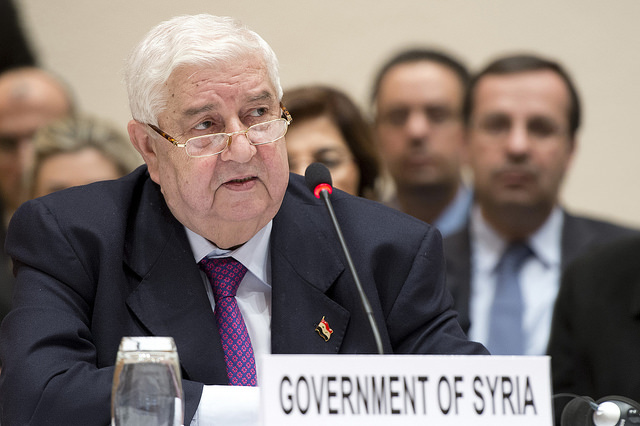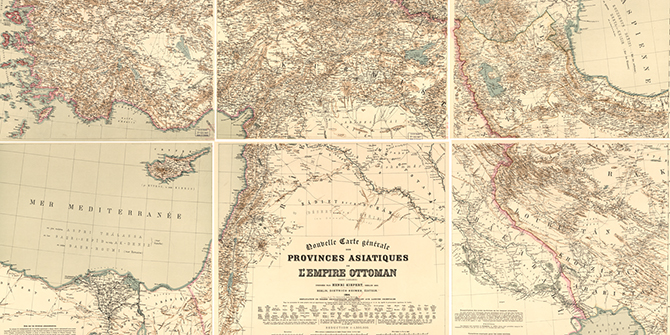by Dr Jasmine Gani

What has been achieved and what can be learnt from the Geneva II talks so far? After the ill-tempered grandstanding at Montreux on Wednesday, modest headway seems to have been made between the regime and opposition delegations over the weekend via the mediation of UN special envoy Lakhdar Brahimi.
First the Syrian government agreed that women and children in the besieged city of old Homs are welcome to leave immediately, while civilian men will be allowed to do so once a list of their names have been handed over to the regime. On a basic level this does represent a degree of progress. However, as should be expected, even these basic concessions present several complications.
Civilians will rightly be wary of any separation of their families. Apart from the difficulties of reuniting families fleeing from the conflict, there is also the concern that remaining men might be labelled as ‘terrorists’, and conveniently isolated in the face of a government attack. Fears of a repeat of Srebrenica have been at the forefront of opposition scepticism. Moreover the requirement of a list of names, which would delay a full evacuation of the city, has similarly raised concerns; the obvious reason is verification that all of those leaving are Syrian civilian nationals – not the foreign fighters nor domestic ‘terrorists’ alleged by the government to be operating in the city. The latter would be harder to disprove and open to arbitrary decision; given that Homs was one of the earliest cities to rise up in protest against the regime, a good many are likely to fall into this category. The main opposition group, the Syrian National Coalition (SNC), fears that this information would then be used to carry out mass detentions.
The second development over the weekend was regarding the issue of humanitarian access. Brahimi confirmed that the UN team based in Syria has already established communication with the governor of Homs to facilitate emergency humanitarian aid to the city, with a decision expected today. This would of course necessitate a localised cease-fire. Since all such previous attempts have failed, this would indeed be a ground-breaking move. Moreover, a three-month food blockade, and a recent attack on Homs by government forces in which 19 people were killed, makes a ceasefire especially urgent.
It also means the onus for this concession appears to fall on the regime, despite Syrian Foreign Minister Faisal Mekdad’s claims that it was opposition forces that carried out the attack and were preventing evacuations. The issuing of completely conflicting narratives from both sides will be a recurring theme of the Geneva talks, in which allegations, deflection of culpability, and the use of press conferences as opportunities for propaganda obscures discussion of real issues. However, it is likely such rhetoric is being reserved for the press and public, while we can gather from Brahimi’s statements that the discussions behind closed doors are of greater substance.
Nevertheless it holds true that the opposition must also play a role in any potential ceasefire in Homs. One of the challenges the political opposition faces – and one which may significantly affect its leverage at Geneva – is that it is not a coherent voice for the rebel military factions on the ground. Many battalions, particularly in the north, are not under the command of the SNC’s military wing, the Free Syrian Army (FSA) – getting the disparate rebel groups to accept any military dictate, let alone a ceasefire, issued from exiled diplomats in Geneva is unlikely to be straightforward. However, if there is a city where this is more likely to succeed it is Homs, where loyalty to the FSA is greater and there has been better coordination between the political and military wings of the SNC.
A third area of negotiation has been the release of detainees held by the regime, and those kidnapped by rebel armed forces that are affiliated with or in contact with the political opposition. Here, the clash of narratives described above is likely to be more problematic. It is one thing for the regime to implement a ceasefire whilst claiming it has sought to do this all along; it is much harder for it to release prisoners when it openly refutes the 50,000 figure provided by the opposition, arguing that up to 70 per cent of the names are fabricated. On the other hand, the weakness of the SNC’s authority over the types of rebel groups engaged in kidnappings also poses an obstacle to their fulfilment of this condition.
Negotiations: A Constructive Step
Despite these complications the talks do represent, if not yet a cause for optimism, then at least the first constructive development in this tragic conflict. It is the first time the (main) conflicting sides are communicating with each other, indeed sitting in the same room. It reflects a tacit acknowledgement of the political opposition by the Syrian government, whatever it may say to downplay its legitimacy and significance – this recognition is the first, and crucial component needed before any deeper engagement can take place, and one which has been absent for the entire three years of the conflict.
This does not mean the regime necessarily believes it needs to engage with the opposition at this stage, as might have been the case if the government was on the back-foot or at least in a state of complete deadlock. In contrast the regime believes it currently has the upper hand, making gains in previously rebel held areas. For the regime, Geneva II is less about the security imperative, and more so an opportunity to mend its international reputation and project the image that it is in control. Moreover, proceedings are being followed closely by Syrians at home, who unlike the warring parties are war-weary, and desperate to see an end to the bloodshed; the regime is keen to use the conference to demonstrate to its domestic audience that the opposition, and not the government, are the obstacles to peace.
In view of these factors it makes sense that negotiations are currently focused on less controversial (albeit still complicated) humanitarian questions, shifting attention away from military and political issues on which the regime has less reason to compromise and the UN’s options for enforcement are slim. The Syrian government is rarely concerned about what the international community thinks of it; but since Russia’s diplomatic coup in September last year and the agreement over chemical disarmament, Damascus has sought to portray itself as more reasonable and more conscientious of international norms than it ever cared to do prior to the chemical weapons crisis. A self-serving survival tactic, and yet one which has opened the door to negotiation, and should be capitalised on to alleviate even a fraction of the human suffering within Syria.
As for the political opposition, it does need these negotiations, far more so than the regime in the current circumstances. The SNC has come under increasing pressure and criticism, even from its western allies, for not being able to forge together a united front and for having set unfeasible pre-conditions that threatened to derail the Geneva talks. Only a week before the talks were to begin, a faction in the SNC walked out in protest at its impending involvement in negotiations – had they got their way, and coupled with increased detachment from the armed rebels, the political opposition would have risked becoming a redundant force. In light of these obstacles, the opposition’s presence is a significant achievement in and of itself; these negotiations could serve to strengthen its coherence and representative influence amongst the wider opposition. Moreover, the opposition has often cited a lack of political experience, imposed on its members by years of repression by the state, as the reason behind its failures and miscalculations; if that is the case, these talks will be its greatest learning curve, as well as its greatest test so far. It will certainly need to muster a lot of patience and stamina in the process, since their opposite numbers have plenty of both and take pride in being stubborn negotiators.
Jasmine Gani is a Fellow in the International Relations Department at LSE. Her research interests include the International Relations of the Middle East, American and British policy towards the Middle East, and US-Syrian relations.





